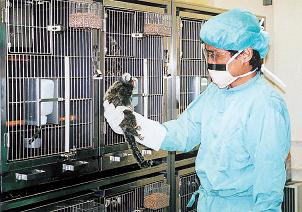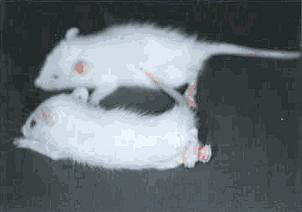| 2. Research on risk evaluation of low-level methylmercury exposure |
Up to the present, more than 2,000 people have been certified as Minamata
Disease patient in Minamata area. Furthermore, many fetuses exposed to
MeHg through the placenta of the exposed mother showed severe cerebral
palsy-like symptoms, while their mothers had mild or no manifestation of
the poisoning. This landmark findings brought worldwide attention to the
high risk of fetal exposure to MeHg. As WHO IPCS recommended, the effect
of MeHg exposure on pregnant women is an important issue for elucidation,
especially in Japanese and some other populations which consume much fish
and sea mammals. In this study, we mainly carry out the epidemiological
and experimental animal studies on the effects of low level methylmercury
exposure on fetus.
1. Effect on common marmoset of low-level methylmercury exposure through
generations
2. Effects of "spike" exposure of methylmercury on mercury accumulation
and neuronal degeneration in the brain
3. Exposure assessment of methylmercury on pregnant and child-bearing women
in relation to fish consumption
4. Study on fetal effects of methylmercury
5. Study and promotion of risk communication on low level exposure to methylmercury
6. Study on association of lifestyle during pregnancy, cord blood methylmercury
and development of offspring
|

Monkey toxicated with long term low-level methylmercury |
縲 |

The effects of methylmercury on the developing brain using a rat model
of fetal-type Minamata Disease |
|